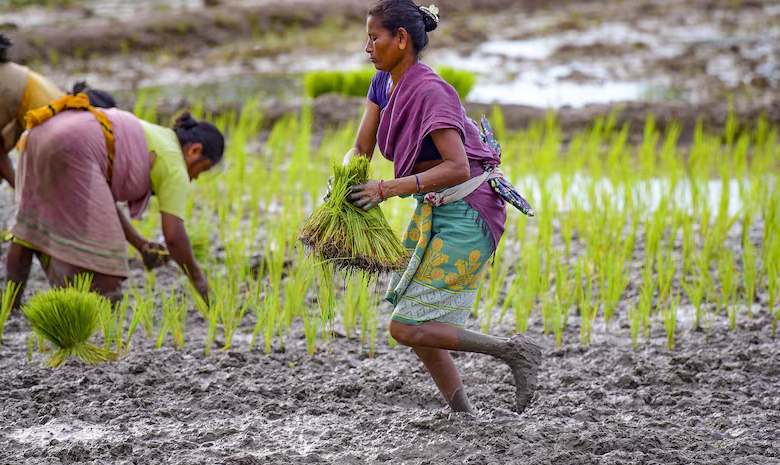Union Budget 2024 Outlines Government Initiatives to Empower Farmers and Boost Agricultural Resilience in India

News Mania Desk/Agnibeena Ghosh/24th July 2024
Agriculture remains the cornerstone of India’s economy, employing a substantial portion of the population and significantly contributing to the nation’s GDP. Acknowledging its critical role, the Indian government has introduced numerous initiatives aimed at enhancing agricultural productivity and resilience. Finance Minister Nirmala Sitharaman’s 2024-2025 budget speech highlights these efforts, focusing on modernizing agricultural practices and supporting farmers.
A significant initiative is the comprehensive review of the agricultural research framework. The government aims to shift the focus towards raising productivity and developing climate-resilient crop varieties. This involves funding research in a challenge mode, encouraging private sector participation. Both government and external domain experts will oversee this research to ensure effectiveness and innovation.
To further boost agricultural productivity, the government plans to release 109 new high-yielding and climate-resilient varieties of 32 field and horticulture crops. These new varieties are expected to help farmers achieve better yields and withstand climate variations, ensuring food security and sustainable agricultural practices.
Natural farming practices are being promoted to reduce dependence on chemical inputs and enhance soil health. Over the next two years, one crore farmers will be initiated into natural farming, supported by certification and branding initiatives. The establishment of 10,000 bio-input resource centers will facilitate the availability of organic inputs, promoting environmentally sustainable farming.
The government is also focusing on achieving self-sufficiency in pulses and oilseeds. Strengthening production, storage, and marketing strategies for these crops is a priority. As part of this effort, a strategy for ‘atmanirbharta’ (self-reliance) in oil seeds such as mustard, groundnut, sesame, soybean, and sunflower is being implemented. This will reduce import dependence and boost domestic production.
To meet the growing demand for vegetables, large-scale clusters for vegetable production will be developed near major consumption centers. The government will promote Farmer-Producer Organizations (FPOs), cooperatives, and start-ups to enhance vegetable supply chains. This includes improving collection, storage, and marketing infrastructure to ensure a steady supply of fresh produce.
Building on the success of pilot projects, the government will facilitate the implementation of Digital Public Infrastructure (DPI) in agriculture. This initiative aims to cover farmers and their lands within three years. A digital crop survey for Kharif crops will be conducted in 400 districts, bringing details of six crore farmers and their lands into the farmer and land registries. The issuance of Jan Samarth-based Kisan Credit Cards will be enabled in five states.
Recognizing the potential of aquaculture, the government will provide financial support for setting up Nucleus Breeding Centers for Shrimp Broodstocks. This initiative will facilitate shrimp farming, processing, and export through financing from NABARD, enhancing the competitiveness of India’s seafood industry.
To fast-track the growth of the rural economy and generate large-scale employment opportunities, the government will introduce a National Cooperation Policy. This policy aims for systematic, orderly, and all-round development of the cooperative sector, promoting inclusive growth and sustainable development.
The government’s initiatives for agricultural resilience and productivity are comprehensive and forward-looking. By focusing on research, promoting sustainable practices, enhancing infrastructure, and supporting farmers financially, these measures aim to transform India’s agricultural landscape. As these initiatives take root, they are expected to significantly boost agricultural productivity, ensure food security, and improve the livelihoods of farmers across the country.
India’s agricultural sector is poised for significant transformation. The government’s multi-faceted approach, encompassing technological advancement, financial support, and sustainable practices, promises to create a resilient agricultural ecosystem. These efforts not only aim to empower farmers but also to secure the nation’s food supply, ensuring long-term economic stability and growth.+






